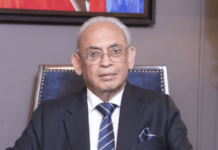Eros International and Hope Productions’ Shamitabh (UA) is the story of a mute man trying his hand at acting in Bollywood and succeeding! Daanish (master Shubham Tukaram Param) is crazy about acting even as a kid in spite of the fact that he cannot speak. He wants to act in Bollywood films and for this, he wants to go to Bombay but can’t because of his mother’s (Sonamoni) illness which the mother feigns to stop him from going to Bombay as she knows, his disability will come in the way of the realisation of his dreams.
After years, Daanish (Dhanush) comes to Bombay once his mother passes away. Obviously, no one takes him seriously because of his handicap. But assistant director Akshara Pandey (Akshara Haasan) realises that he has a lot of potential and pitches him to the director she works for. The director refuses to give Daanish a break because of the speech problem. Just then, Akshara’s doctor-father (Uday Tikekar) gets to know of a medical advancement in Finland, which could help mute people ‘speak’. Daanish is flown to Finland and the procedure on him is successful. An ear-piece is given to Daanish, which has the ability to store the words spoken by another voice with a similar ear-piece (which ear-piece would enable the other person to hear all that is spoken to the mute person, if the other person is within the range of the mute person’s ear-piece) so that the mute person can then give lip movement to the spoken words and pretend to be speaking them. Daanish returns to India and now begins the search for a suitable voice.
Daanish and Akshara come across Amitabh Sinha (Amitabh Bachchan) who has a wonderful voice. Sinha is a drunkard and lives in the cemetery, drowning himself in alcohol as he has nothing better to do. He had aspired to be a Bollywood actor but had failed. The two request him to become Daanish’s voice. At first sceptical, Amitabh Sinha soon gives in, though grudgingly. So that nobody should know that Daanish cannot speak, Amitabh Sinha, who at all times has to be in close proximity to Daanish, is introduced as upcoming hero Daanish’s valet, Robert.
Daanish gets a break when a filmmaker (Ivan Rodriguez) plans to launch him in Lifebuoy. Daanish gets a new screen name, Shamitabh. He becomes a huge success with the release of his very first film. Robert resents that all the attention and adulation is going to Shamitabh as he feels, his contribution to the success is much more than that of Shamitabh himself. Soon, ego problems develop between the two. Shamitabh signs a film which Robert doesn’t approve of and the tension starts to show on the sets. Ultimately, the partnership breaks up. Shamitabh acts in a film in which the hero is shown as a mute person but that film flops. On his part, Amitabh Sinha lends his voice to another new hero (who is good-looking but who stammers), but that film also fails at the box-office.
It is now clear that Shamitabh and Robert are incomplete without each other. Do they resolve their differences? If so, how? Do they become a formidable team over again.
Balki’s concept is novel but the script is implausible. Even the implausibility of the script may not have been such a big impediment in the enjoyment of the drama for the audience had the screenplay been convincing. But R. Balki’s screenplay, unlike his story, is so full of flaws that it just doesn’t hold water. Amitabh Sinha alias Robert has such a massive ego that it is unpalatable. And why does he have such a big ego? What has he done in life? He is a failure who is just wasting his time, downing bottles of whisky, living in a cemetery shabbily; he had been rejected by filmmakers. It is not as if Shamitabh is not paying him for lending him his voice. Then what is the reason for Robert’s frustration – why does he resent Shamitabh’s success so much? Especially because he himself wanted to be an actor, isn’t Amitabh Sinha aware that the adulation will go to the face rather than the voice, more so because the fact of the voice being different from the face is never going to be revealed to the public? Even this unfounded ego would have worked had Amitabh Sinha been projected as a villain of the drama but R. Balki clearly doesn’t want that. And a hero behaving the way Amitabh Sinha alias Robert behaves – that too, from the start and for a long time – is just not acceptable to the paying public. Frankly, the ego problems begin too, too early. If the ego problems had started only gradually, things may have been better for the audience (as far as acceptability is concerned) but one is sure, even in that case, the point of the voice being a bigger force than the face would have never been digested by the viewers. Here, it would not be out of place to mention that the writer seems to have erred in giving the actor more importance than the character he plays. That Amitabh Bachchan is one of the greatest actors we have is indisputable. But in the film’s drama, to have given the character of Amitabh Sinha so much importance is unpalatable because, after all, he is a voice which the public will never know is not Shamitabh’s. Also, in a country like India, where people worship Bollywood superstars, they worship them for the looks, charm, acting talent and, perhaps, to some extent, because of their baritone. If that were not so, every actor with a great voice would be a huge star. But, as everyone knows, Arjun Rampal, with a superb voice, is not a hugely successful actor in Bollywood.
The entire point of Robert rejecting a script is just not appreciated by the audience. After all, the viewers feel, when did Shamitabh give that right to Robert for him to feel bad when he (Shamitabh) signs a film rejected by him (Robert)? In other words, the conflict between Shamitabh and Robert, which should have been the high point of the film, is the weakest part of the drama. Clearly, the writer has gotten too carried away with the concept and with Amitabh Bachchan’s persona and over-indulged himself.
The drama moves at an excruciatingly slow pace, testing the audience’s patience. Besides, the drama is so verbose that it actually tires the viewers. Yes, Amitabh Sinha alias Robert speaks so much that it overshadows even the impact of his golden voice which is at the centre of the drama.
Shamitabh and Robert fighting with their fists, at one point of time, looks a bit absurd. But while this is just a minor aberration, one of the weakest points in the screenplay is that the viewers’sympathy goes to neither of the protagonists in the drama. It doesn’t go to Shamitabh because he is an over-confident man. And the sympathy doesn’t go to Amitabh Sinha because he is one hell of a pompous guy who doesn’t deserve anyone’s sympathy.
This is not to say that the film does not have any plus points as far as the script is concerned. It does have. The light moments in the film are very enjoyable, but, of course, too class-appealing. There are also moments in the film which touch the heart but they are few and far between. However, because of the absolutely flawed screenplay, the impact of the plus points is drastically diluted, which, in any case, are meant more for the enjoyment of the audience in the cities, that too, those who frequent the high-end multiplexes mainly.
Amitabh Bachchan does a fantastic job and acts with effortless ease. He gets into the skin of the character and comes up with a memorable performance. Having said that, it must be added that he (his character) speaks so much in the film that the audience literally gets tired of listening to him. A certain kind of boredom consumes the viewer in the scenes of Amitabh Bachchan after a point of time because of the sheer verbosity of the drama. Dhanush is very good. He makes the character of Daanish alias Shamitabh believable but is unable to make it endearing, thanks in no small measure to the deficiencies in the script. Akshara Haasan makes a confident debut but needs to improve her dialogue delivery. She looks pretty but her hairstyle (with her hair often covering almost her entire face) is an irritant. Ajay Jadhav shines as Amitabh Sinha’s Man Friday, living with him in the graveyard. Master Shubham Tukaram Param is cute as little Daanish. Asif Ali Beg (as the doctor) is alright. Uday Tikekar does well as Akshara’s doctor-father. Rajeev Ravindranathan makes his presence felt as the journalist. Karim Hajee and Ivan Rodriguez (both as film directors) are adequate. Sonamoni has her moments as Daanish’s mother. Abhimanyu Choudhry (as the lead actor of Thappad) and Prateik Katare(as young Daanish) are okay. Rekha leaves a mark and a smile on the viewers’ faces in a special appearance. Rajkumar Hirani, Karan Johar, Rohit Shetty, Mahesh Bhatt, Ekta Kapoor, Boney Kapoor, Javed Akhtar, Rakeysh Omprakash Mehra, Prahlad Kakkar and Swanand Kirkire, all in special appearances, are appropriate. Others do as desired.
Balki’s direction is good but his narration is unable to camouflage the many defects in the script. Music (Ilaiyaraaja) is fair, with two songs, ‘Sha sha sha mi mi mi’ and ‘Piddly’, being quite appealing. A hit music score would’ve worked wonders for the film. Lyrics (Swanand Kirkire and Kausar Munir) are good. Choreography of the songs, by Bosco-Caesar, is quite alright. P.C. Sreeram’s cinematography is of a very good standard. Urvi Ashar and Shipra Rawal’s production designing is nice. Hemanti Sarkar’s editing is crisp.
On the whole, Shamitabh is good at the concept level but that’s about all. With a screenplay full of holes and lack of entertainment for the large mass base of audience, it will fail at the ticket windows. Although business in premium multiplexes in a few big cities will be okay, it will be grossly insufficient to cover the heavy investment in the film. Collections in most single-screen cinemas and small centres will be very poor.




























